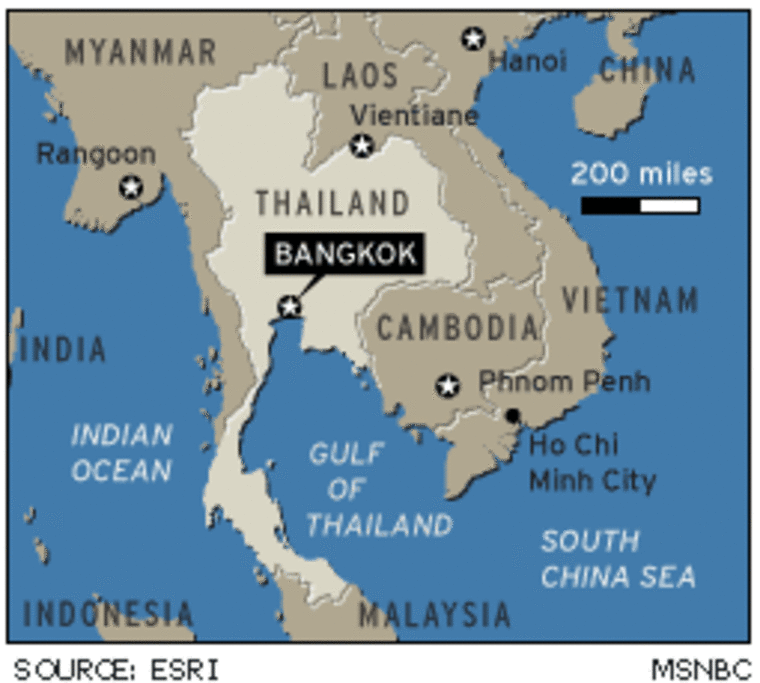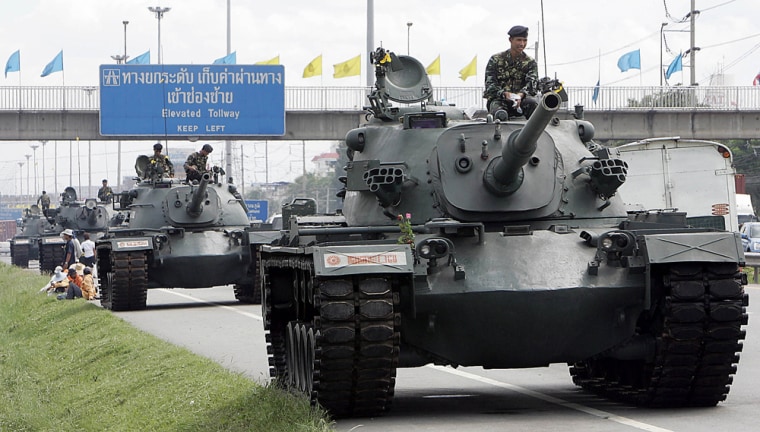Thailand’s new military rulers appointed nine people Friday to investigate corruption under deposed premier Thaksin Shinawatra and announced plans to write a new constitution to hold future leaders more accountable.
Lt. Gen. Palanggoon Klaharn, a spokesman for military leaders who seized power late Tuesday while Thaksin was abroad, told a news conference that the group reaffirms its “intention to bring back peace and order.”
The military rulers, formally called the Council for Democratic Reform under Constitutional Monarchy, said they were appointing nine people to a reconstituted corruption commission to investigate wrongdoing by the Thaksin government.
Following their rapid, bloodless coup, the council scrapped Thailand’s 1997 constitution, which had been aimed at ushering in a stable democracy, but instead allowed Thaksin to consolidate extraordinary powers in his hands.
Palanggoon said an effort would be made to work out the “loopholes” in the constitution to make leaders more accountable.
The new military rulers also searched for a prominent, corruption-free civilian to be interim leader while purging Thaksin’s associates, including four senior police officers. They were holding three ministers of the deposed government in custody and other detentions were expected.
Who will be interim PM?
Under sharp international criticism for the coup, the council has promised to appoint an interim prime minister within two weeks.
Speculation in the local press Friday focused on several possible prime ministerial candidates with clean records including Supachai Panitchpadki, who heads the U.N. Conference on Trade and Development, or UNCTAD, Supreme Administrative Court President Ackaratorn Chularat, and Pridiyathorn Devakula, who heads Thailand’s central bank.
Supachai, who formerly headed the World Trade Organization, enjoys a sound international reputation while Ackaratorn was earlier mandated by King Bhumibol Adulyadej, the country’s revered and powerful monarch, to resolve the political crisis swirling around Thaksin through legal means. Pridiyathorn is a highly regarded economist and may, according to analysts, be slated for the finance portfolio instead.
The coup leader and army commander, Gen. Sondhi Boonyaratkalin, who already received a royal endorsement from the king, took part in a nationally broadcast ceremony Friday which formalized the monarch’s backing.
Sondhi and other military leaders stood at attention in white uniforms as a statement from the palace was read aloud at army headquarters, recognizing Sondhi as head of the council.
Sondhi then kneeled and bowed before a shrine with a framed photo of the king, in a show of respect for the monarch.
Ousted Thaksin to take ‘deserved rest’
Thaksin, in London, said in his first public statement since the coup that he wanted to take a “deserved rest” from politics and that he did not challenge the military takeover, calming fears in an otherwise business-as-usual Bangkok that the former leader may attempt a comeback that could lead to bloodshed.
Thaksin arrived Wednesday in London from New York. The statement did not say whether he intended to make his base in London, where he owns property.

The telecommunications tycoon-turned-politician would almost certainly face some kind of legal action if he returned to Thailand.
Many Thais appear relieved at the resolution of political tensions festering since the beginning of the year, when street demonstrations accusing Thaksin of corruption and urging him to step down started growing in size and vehemence.
Critics alleged he took advantage of his position as head of government to enrich himself and his associates, and also accused the prime minister of challenging the king’s authority — an unpardonable act in the Southeast Asian nation.
